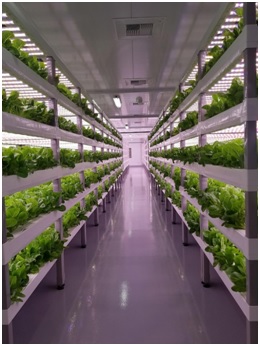Vertical Farming in India
- Posted By
10Pointer
- Categories
Economy
- Published
26th Apr, 2022
-
What is Vertical Farming?
- Vertical farming is a unique concept of growing food in line with indoor farming, urban agriculture, and controlled agriculture environment.
- Instead of horizontally on the ground like traditional farming, vertical farming grows crops in vertical, stacked layers without putting too much impact on land and water resources which are scarce.
- It includes soilless farming techniques, among others.
- Vertical farming is done in constantly monitored and adjusted factor of productions such as temperature, lighting, nutrients, irrigation and air circulation.
- Vertical Farming is growing plants in vertically stacked layers.
- In vertical farming soil, hydroponic or aeroponic growing methods can be used.
- Where arable land is less, at those places vertical farming is used.
- Such places are mountainside towns, deserts and cities grow a different type of fruits and vegetables.

|
Background
- Notably, in 1915, Gilbert Ellis Bailey coined the term vertical farming and he went on to write a namesake book.
- The modern concept was first proposed in 1999 by Professor Dickson Despommier.
- His concept centered on the idea that urban areas should grow their own food which can save time and resources required for transportation.
|
Different systems under vertical farming
- Hydroponics: To reduce soil-related cultivation issues, hydroponics involves growing food in water by using its natural, mineral content.
- Aeroponics: It is said that NASA (National Aeronautics and Space Administration) motivated the initiative of aeroponics to find an efficient way to grow plants in space in the 1990s.
- Since there is no one growing medium, nutrient solutions are sprayed over plants, which requires very less eater, no soil, and minimal space.
- Aquaponics: The term combines fish farming and hydroponics. The nutrient-rich waste from fish tanks serves as a fertiliser for the hydroponic plants.
Advantages of Vertical Farming:
- Year-round crop production
- Eliminates agricultural runoff
- Significantly reduces use of fossil fuels (farm machines and transport of crops)
- Makes use of abandoned or unused properties
- No weather related crop failures
- Offers the possibility of sustainability for urban centers
